

What is the bystander effect? What Is the Bystander Effect? If you witnessed an emergency happening right before your eyes, you would certainly take some sort of action to help the person in trouble, right?
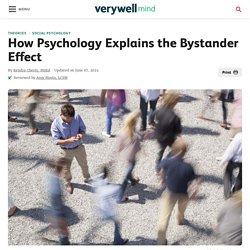
While we might all like to believe that this is true, psychologists suggest that whether or not you intervene might depend upon the number of other witnesses present. What Is the Bystander Effect? The term bystander effect refers to the phenomenon in which the greater the number of people present, the less likely people are to help a person in distress. When an emergency situation occurs, observers are more likely to take action if there are few or no other witnesses. Being part of a large crowd makes it so no single person has to take responsibility for an action (or inaction). In a series of classic studies, researchers Bibb Latané and John Darley found that the amount of time it takes the participant to take action and seek help varies depending on how many other observers are in the room.
The Bystander Effect - Standing Up From the Crowd - Extra Credits. The Bystander Effect. Bystander Behavior in School Setting. Gender stereotype influence in bystander effect. Image by Dominik Deobald, via Wikimedia Commons It’s summer.
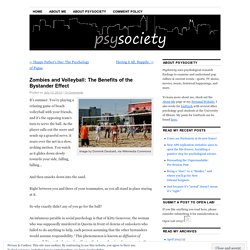
You’re playing a relaxing game of beach volleyball with your friends, and it’s the opposing team’s turn to serve the ball. As the player calls out the score and sends up a graceful serve, it soars over the net in a slow, arching motion. You watch as it glides down slowly towards your side, falling, falling… And then smacks down into the sand. Right between you and three of your teammates, as you all stand in place staring at it. So why exactly didn’t any of you go for the ball? What a Tragic Traffic Incident Says About Chinese Social Ethics. A video recording of another horrific traffic incident has gripped Chinese social media.
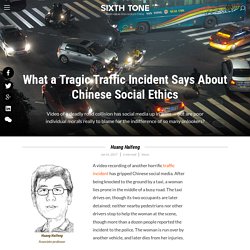
After being knocked to the ground by a taxi, a woman lies prone in the middle of a busy road. The taxi drives on, though its two occupants are later detained; neither nearby pedestrians nor other drivers stop to help the woman at the scene, though more than a dozen people reported the incident to the police. Hit and Run in China, no one helps. Fear of wrongfully prosecuted emboldens bystander effect. The Science of Empathy. How to Overcome the Bystander Effect. Psychologists have long been interested in exactly why and when we help other people.
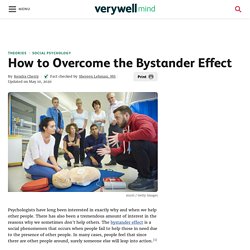
There has also been a tremendous amount of interest in the reasons why we sometimes don't help others. The bystander effect is a social phenomenon that occurs when people fail to help those in need due to the presence of other people. In many cases, people feel that since there are other people around, surely someone else will leap into action.1 While the bystander effect can have a negative impact on prosocial behavior, altruism and heroism, researchers have identified a number of different factors that can help people overcome this tendency and increase the likelihood that they will engage in helping behaviors.2 Some of these include: Witnessing Helping Behavior Sometimes just seeing other people doing something kind or helpful makes us more willing to help others.
Imagine that you are walking into a large department store. Being Observant Being Skilled and Knowledgeable Guilt Feeling Good. It looks like human beings might be Good Samaritans after all. A few years ago, I was assaulted on a busy street in London by a man who came up behind me.
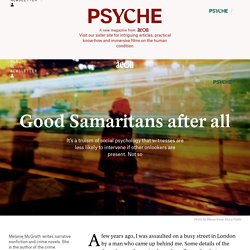
Some details of the assault are hazy, others pin-sharp. I recall exactly what my attacker did, and that the assault was witnessed by rush-hour drivers sitting at a red light. If there were pedestrians nearby, I do not remember them, though the situation suggests that there were people at hand. I do remember that no one came to my aid. On the face of it, this looks like a textbook case of bystander apathy – the failure of onlookers to intervene in troubling, violent or even murderous events when others are present. Bystander effect: Famous psychology result could be completely wrong. By Grace Browne SolStock/Getty If you were being attacked, would anyone stop to help you?

A famous result in psychology known as the bystander effect says probably not, but now a review of real-life violent situations says this commonly held view may be wrong. The bystander effect purports that in situations such as a robbery or a stabbing, bystanders are less likely to step in if there are a large number of people in the area, so the likelihood of intervention decreases. The idea has its roots in the 1964 case of Kitty Genovese, a 28-year-old woman who was raped and murdered in the early morning in her quiet neighbourhood in Queens, New York. Advertisement It turns out that the number of observers in that case was an exaggeration, but the incident has become part of psychology legend. Potential explanations for the phenomenon include that individuals may feel less responsibility to intervene when many other people are around, as well as fear acting inadequately when being observed.
Would I be Helped Cross National CCTV Footage Shows That Intervention Is the Norm in Public Conflicts Postprint. Is the bystander effect a myth? - BBC News. Conclusion.